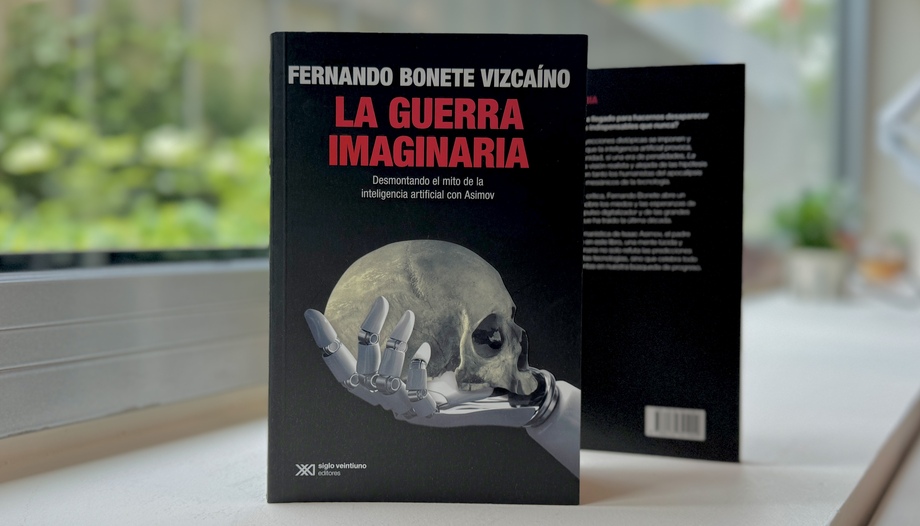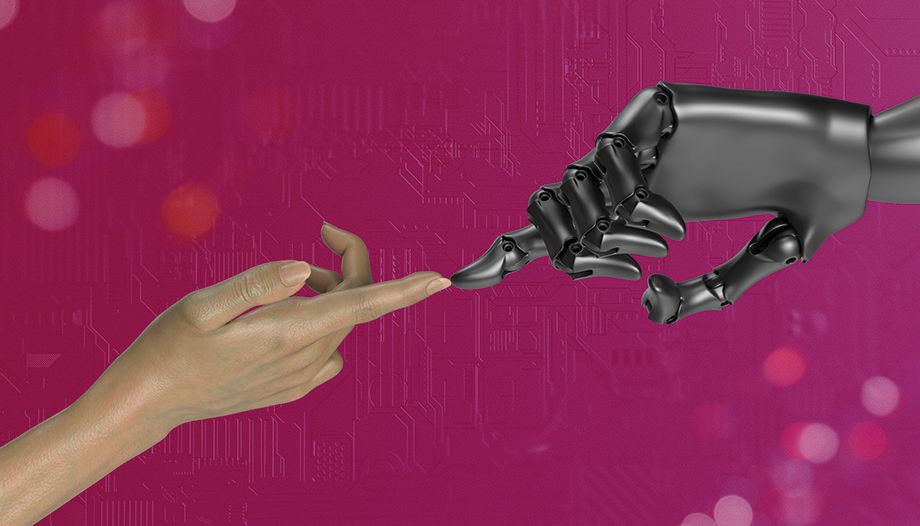With its arrival, Artificial Intelligence has brought with it an air of confrontation. Many authors have raised an "apocalyptic" cry, as Fernando Bonete Vizcaíno says. Lolo Young Journalism Award 2023 and PhD in Social Communication, Bonete is also the author of the book "The imaginary war. Desmontando el mito de la Inteligencia Artificial con Asimov", where he strives to show that the relationship between man and machine is not necessarily one of confrontation, but could be transformed into a collaboration that would result in a real progress of society.
As a university professor, journalist, and content creator at social networksFernando Bonete has experienced firsthand the strong impact of the Artificial Intelligence. And perhaps it is precisely for that reason that he is able to see the opportunities that technology represents for us today.
What can a humanist contribute to the Artificial Intelligence debate?
- The humanities have three fundamental pillars without which they would not be what they are. In the first place, surprise in the face of reality. Ortega y Gasset said that to be surprised is to begin to understand. That is to say, when one encounters reality and something catches one's attention and surprises one, that is when one begins to investigate the why, how and what of things. This is a fundamental pillar of the humanities, because from there comes everything else. The second pillar is to wonder about that which has amazed us, and the third is the search for an explanation of things that is not reduced to a single discipline, but is as complete as possible.
None of these three things can be done by the machine. The machine cannot be surprised by reality. It registers in a descriptive way what it is seeing, but it is not capable of wonder. The machine is not capable of asking itself questions, even though it can answer them. On the other hand, the explanation that machines give to our questions is always reduced to a series of questions, but it is not capable of making a global reading, because it lacks basic components of real intelligence, such as affectivity, emotion or context.
Therefore, the contribution of a humanist is everything, in the sense that nothing that the humanities contribute can be contributed by the machine.
A program has the limit of the code with which it has been made. If programming advances enough to design very elaborate codes, can't this theory about the advantage of humanities over artificial intelligence fall down?
- The future is unpredictable. I can only answer the question with evidence based on the current state. What the experts tell us is that the computational system on which machines are currently based has limits. Computing systems condition the machine to make abductive inferences, that is, to draw conclusions from repeated events over time that usually give a series of results that are also habitual. With this we leave out a fundamental component of the reaction to the reality of problems, which is, for example, creativity.
Creativity and innovation are associated with seeking different solutions to problems that have been occurring over time but that, due to a series of circumstances, need to be solved in a different way. Ultimately, the machine is not capable of providing these different answers to the previous ones.
Will computational systems change so that they move beyond the state of abductive inference and approach creativity? We don't know, but it would take a lot of computing power to do so. Now, even getting to that possibility, the machine will always lack the ability to feel, to emote, to believe and have faith, or even the fact that it has desires and purposes of its own. Therefore, even if its computing system were close to innovation, it will never be able to equal the human being because there is something proper to the human condition that the machine, by its artificial constitution, will never be able to have.

In the book you distinguish between logic, which is characteristic of machines, and reasoning, which is characteristic of human beings. Can you elaborate on these concepts and explain the difference?
- The machine is capable of drawing logical conclusions from circumstances that it has already registered in one way or another in its own system. Reasoning takes us beyond this, in the sense that we do not only draw logical conclusions, but we are able, even without knowing those circumstances, by means of intuition, to take those conclusions a little further.
The machine cannot intuit, it has no perception of the context that we have. This intuition endows the solutions we provide with an immense richness.
Artificial Intelligence is a very valuable tool because it gets us up to speed. It's not going to replace us as long as we get back to the nature of what our work is about.
Fernando Bonete
You are a university professor and content creator. You have experienced the entry of Artificial Intelligence into these areas first hand. What can you tell us about the arrival of these programs in these areas?
- For me, Artificial Intelligence in these and other fields is an extremely valuable tool. I cannot share the pessimistic and negative view of many colleagues, although I understand it because it is based on a somewhat apocalyptic dominant discourse on the subject. But this discourse has no basis in science or experience.
The discourse that sees Artificial Intelligence as something negative is based on the assumption that Artificial Intelligence is going to replace teachers or content creators. This vision is not real, at least if we consider the role of the teacher and the content creator as they really should be.

If we understand the teacher's work as that of someone who comes to a class, "vomits" a manual and leaves, without generating original, own and critical thinking, encouraging students to participate in it, of course the teacher is dispensable and we can put a machine in his place. However, if the teacher develops his work by making the students generate their own thinking and ask themselves the right questions, then the teacher becomes irreplaceable. Because we have already indicated that the machine cannot do that.
The same goes for the content creator. If we think of the content creator as someone who copies, creates and recreates content that already exists, then of course he can be replaced by a machine. But if he dedicates himself to contributing something of his own and puts his personality and dedication into the creation of content, so that it is original and unique, then he will never be replaceable.
Therefore, I consider Artificial Intelligence to be a very valuable tool because it puts us in the driver's seat. It's not going to replace us as long as we get back to the nature of what our work is about. I am delighted that Artificial Intelligence has raised these concerns, because it is going to revive the university, it is going to make it find itself again. The same thing is happening in journalism, because journalists can no longer just copy and paste press releases, they have to go back to their job of knowing how to ask the right questions.
Would you say that Artificial Intelligence is really intelligence?
- No. From a technical point of view, what we call Artificial Intelligence is not intelligent, it is just a term we use to designate the concept. There are many very diverse and complex definitions, but to summarize we can define intelligence as the ability to solve random problems. By random, we mean any type of problem. Artificial intelligences can solve concrete problems, in some cases even better than humans, such as the game of chess. But when faced with a problem other than the one it is intended to solve, the machine cannot obtain an optimal result.
This does not mean that man can solve any kind of problem, but he has the tools to try if he wants to. At the moment there is no machine capable of solving random problems.
In addition, intelligence has an emotional component that the machine does not have. Intelligence is also driven by desire and will, by purpose, something the machine lacks.
By confronting man with the machine, we realize how important we have everything in our lives.
Fernando Bonete
Going back to the confrontation that many see, what would you like the collaboration between man and machine to look like?
- I use Artificial Intelligence a lot as an accompaniment to alleviate the tasks that are purely mechanical. This allows us to have more time to develop other tasks in which we need to put all our potential. I think that is the best use that can be made of these tools. The problem is in giving the machine tasks that should only be done by a human being. If we do this, we are shutting down.

What do we learn about man by putting him next to the machine?
- We learn that the machine does not have everything that is truly important in life: friendship, love, purpose, faith... By confronting man with the machine, we realize everything important that we have in our lives. In that sense, we discover everything that is unique to the human being. The machine is a fabulous mirror, because it allows us to discover the true essence of the human being.
We are in a society in which utility is a priority and we cannot deny that the machine is very useful. Can we not conclude that today the machine is much more valuable than man?
- We need to realize that a vision based on utility is wrong. It does not coincide with the true being of man. If we do not realize this, Artificial Intelligence will become a great risk for mankind. But, at the same time, we have a chance. We can finally realize that the utilitarian worldview does us no good.
Artificial Intelligence can be used to do things right or wrong. If we use it badly, we will go deeper into the utilitarian vision and we will shut down as a society. However, its arrival can be a point of reaction to see that we cannot define ourselves only by our utility, but that there are things intrinsic to human dignity that transfer from utility. It is in our hands to decide what we do.








